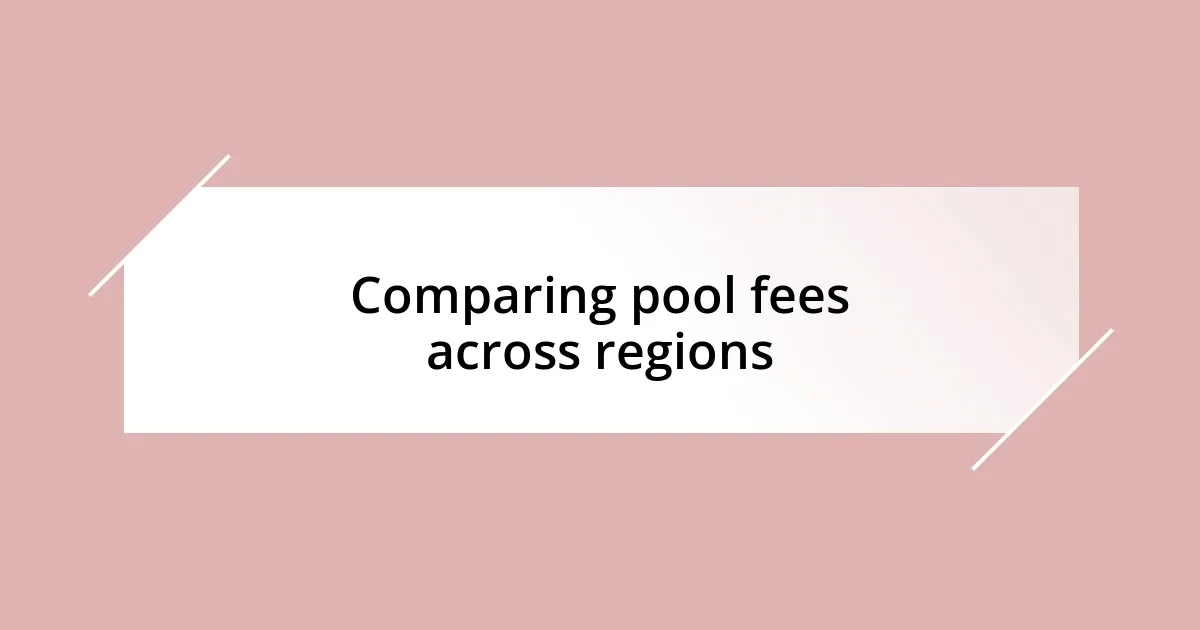Key takeaways:
- Understanding the various types of pool fees, including maintenance, utility, and chemical costs, is crucial for accurate budgeting.
- Factors such as location, pool size, and maintenance services significantly influence overall expenses.
- Negotiating pool fees can lead to savings, particularly during off-seasons and by leveraging competitive quotes.
- Consistent budgeting and tracking of expenses help manage and uncover potential savings in pool ownership.

Understanding pool fees
Understanding pool fees can be quite an eye-opener, especially for first-time pool owners. When I first delved into this world, I remember feeling overwhelmed by the various costs associated with maintaining my pool. It’s not just about the upfront expenses; there are ongoing fees linked to utilities, routine maintenance, and even seasonal preparations. Have you ever paused to consider how much of your monthly budget might disappear into that tranquil backyard oasis?
One surprising aspect I found was that these fees can vary significantly based on location and pool type. In my experience, the monthly maintenance fees for an above-ground pool can be quite different from those of an in-ground pool, often due to the added complexities of heating and cleaning. Sometimes, when I reflect on those numbers, I wonder: are the benefits of relaxation and family time worth the cost? For me, they are, but that’s a personal calculation each owner must make.
Additionally, hidden fees can sneak up on you—like the sudden pump repairs or chemicals that you didn’t budget for. I remember one summer, my pool heater malfunctioned, and I was hit with a hefty bill I didn’t see coming. It’s a stark reminder that owning a pool is more than just enjoying the water; it’s about staying prepared and informed. Have you thought about how to mitigate these surprise costs in your own pool journey?

Types of pool fees
There are several types of pool fees you might encounter, each impacting your budget in different ways. I remember sifting through my options when I first started, and it was a bit daunting. From maintenance to utility costs, these fees can add up quickly.
Here are some common types of pool fees:
- Monthly Maintenance Fees: Regular costs for keeping your pool clean and in good condition.
- Utility Bills: Increases in water and electricity expenses, especially with climate control systems.
- Chemical Costs: Budgeting for chlorine, pH balancers, and other necessary chemicals can be a surprise.
- Repair and Replacement Fees: Unexpected fixes like a broken filter or a damaged liner can arise.
- Association Fees: If your pool is part of a community or club, they might charge monthly or annual fees.
Each fee has its own story, and I’ll never forget the time I underestimated my chemical costs. After a particularly hot summer, the price of chlorine skyrocketed, and I realized I needed to adjust my budget significantly. It’s one of those learnings that stays with you, illustrating just how essential it is to thoroughly plan for these expenses.

Factors influencing pool fees
Understanding the factors influencing pool fees can greatly affect how you plan your pool ownership budget. One crucial element is the geographical location of your pool; in my experience, pools in warmer climates typically incur higher utility costs due to increased evaporation and more frequent cleaning sessions. It’s fascinating how local weather patterns influence our monthly bills, isn’t it? Moreover, the type of pool—whether it’s above-ground or in-ground—plays a significant role, affecting everything from maintenance to construction costs.
Another significant factor to consider is the size of your pool. In my own journey, I’ve seen how larger pools can lead to higher chemical and maintenance fees. When I moved from a modestly sized pool to a larger one, the jump in expenses caught me off guard. I often asked myself if it was worth the extra space for entertaining. It certainly was, but managing those additional costs became an essential part of my lifestyle adjustment. Have you ever considered how size might impact your own pool expenses?
Lastly, the type and frequency of maintenance services can really sway your pool fees. I’ve strayed from DIY cleaning due to the time and effort it demands, and I learned firsthand that hiring a professional can be a game-changer. I remember the first time I opted for a service: the peace of mind I gained from not having to scrub tiles on a hot summer day was worth every penny. That experience led me to realize that sometimes, investing a bit more upfront can save you time and stress in the long run.
| Factor | Influence on Pool Fees |
|---|---|
| Location | Higher utility costs in warmer climates |
| Pool Type | Varied maintenance demands between above-ground and in-ground |
| Size | Larger pools lead to increased chemical and upkeep costs |
| Maintenance Services | Professional help may reduce personal effort but raises fees |

Comparing pool fees across regions
When I started looking at pool fees in different regions, I was astounded by how much variance there was. For instance, in suburban areas, monthly maintenance fees can be significantly lower compared to urban settings, where demand often drives prices up. Have you ever wondered why costs differ so much from one neighborhood to another? It’s all about the local supply and demand—something I hadn’t considered until I experienced it firsthand.
During my travels, I discovered that regional decisions on pool chemical costs can also vary dramatically. I remember visiting a coastal town where cleaner, softer water resulted in lower chemical expenses. It made me reflect on how factors like local water sources directly impact our financial planning. Looking back, I realized I could have saved a good chunk of change if I had researched regional variations more thoroughly before installing my first pool.
Additionally, I noticed how community amenities can influence overall fees. In some places I’ve visited, homeowners associations (HOAs) charge a premium for access to shared pools and facilities, which can take a toll on your budget. I once lived in a neighborhood where the HOA fees were an unexpected burden; they demanded more than just pool upkeep—they added recreational and social responsibilities too. It’s a game of weighing costs and benefits—is the extra fee justifiable when pooled resources mean better-maintained facilities? The deeper I dove into these regional comparisons, the more I appreciated the nuanced financial landscape of pool ownership.

Negotiating pool fees effectively
Negotiating pool fees can feel a bit daunting at first, but I’ve learned that it’s all about confidence and preparation. When I approached my pool service provider for a review of my fees, I came armed with comparable quotes from local competitors. It was interesting to see how just a few well-researched figures could shift the dynamic of our conversation. Who would have thought that friendly competition could work in my favor?
I also discovered that timing plays a crucial role in negotiations. When I initiated my discussions during the off-season, the service providers seemed more open to discussions about lowered fees. I vividly remember how my pool technician was willing to negotiate both the pricing and the maintenance schedule, simply because it wasn’t peak pool season. Have you ever considered how the time of year can impact your negotiating power?
Listening actively during these negotiations has proven invaluable for me. I recall a situation where I asked my provider about the rationale behind certain charges, which opened doors to conversations about potential discounts or package deals. It struck me how building rapport fostered a sense of transparency—sometimes, asking the right questions can lead to uncovering hidden opportunities. How might a friendly conversation shift your perspective on pool maintenance costs?

Tips for managing pool fees
Managing pool fees can feel overwhelming, but I’ve found that budgeting is my best ally. Each month, I set aside a specific amount to cover pool maintenance, and it really helps me avoid any surprises. Have you ever considered how small, consistent contributions can build up over time? That feeling of financial control is freeing, I assure you.
Throughout my journey, I’ve also learned the importance of keeping track of all expenses associated with pool ownership. I use a simple app to record everything from maintenance to chemicals. Just last summer, I realized I was spending significantly less than expected on heating costs by monitoring my usage patterns. Seeing the data laid out clearly motivated me to make adjustments and save even more. What if you could uncover hidden savings just by tracking your spending more closely?
Another strategy that has served me well is seeking out group discounts through community organizations or pool clubs. When I participated in a local pool owners’ meet-up, I discovered members could collectively negotiate lower rates with service providers. Not only did I save money, but I also formed connections with fellow pool enthusiasts. Isn’t it amazing how collaboration can lead to both savings and a sense of community?














